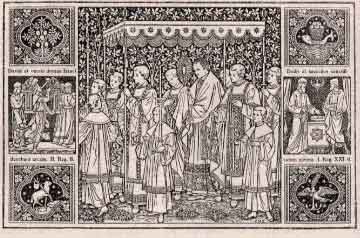
O Sacrum convivium,
in quo Christus sumitur,
memoria recolitur Passionis
Ejus, mens impletur gratia
Et futurae gloriae pignus
nobis datur.
( O sacred banquet, wherein Christ is received, and a remembrance of his passion is recounted! The soul is filled with grace, and a pledge of future glory is given.)
On this day, Western Orthodox Christians, along with Roman Catholics, Anglo-Catholics and high-church Lutherans, celebrate the great feast of Corpus Christi. Some Orthodox Chirstians of the Byzantine Rite might be puzzled that this feast could ever be considered Orthodox, but if indeed the Eucharist is the supreme icon of Christ, why not be blessed by it, venerate it, IN ADDITION TO eating and drinking it? On this great feast, we reflect on what Christ has done for us in giving us his holy body and precious blood: this he did for the life of the world. While on Maundy Thursday (or Holy Thursday), we commemorate the insitution of the Eucharist, on Corpus Christi we celebrate as the culmination of the cycles of the Sacred Triduum, Pascha, Pentecost and Trinitytide the Blessed Sacrament, in thanksgiving to the One whose delight it is to abide in our midst.
When we partake of the Eucharist, we are not engaging in cannibalism. Cannibalism is a partaking of a dead human body. When we partake of the Eucharist, we are partaking in something that is even more alive than we are. We take in food for nourishment, and it becomes a part of us. Not so with the Blessed Sacrament, for when we partake of it, we are transformed into his likeness, becoming ever more perfect "icons" of him who gave himself for us. St. Thomas Aquinas, that venerable teacher of the Latins, captures the essence of this mystery, in a way that both Eastern and Western Christians can appreciate:
Among the immeasurable benefits, which the goodness of God hath bestowed on Christian people, is a dignity beyond all price, for, as saith Deuteronomy: What nation is there so great, who hath God so nighunto them, as the Lord our God is unto us? Concerning this dignity which was bestowed upon us, let us remember that the only-begotten Son of God was pleased to make us partakers of the divine nature; that is to say, he took our nature upon him, being himself made man that he might (as it were) make men into gods. (Opusculum 57)
Yes, it is his pleasure to "tabernacle" in our midst, so that an ineffable exchange can take place: as he takes our humanity, he gives us his divinity, that we, by grace, may become what he is by nature. The Eucharist is that pledge whaereby Christ covenants with us to always abide with us, and make us partakers of his divine nature. This fulfills our highest calling as human personsrestoring, in Christ, man's original priestly role in the created order.
Any wonder why we "praise, worship and adore Jesus Christ on his throne in glory in heaven, and in the most holy sacrament of the altar?" How could we not?
A happy feast to all!
1 comment:
What better can we do than to adore the Lord in person. His Body and Blood are what can get the sinner into heavan. The East can also learn from the West.
I think of The words of the Ave Verum..
Hail to Thee true Body sprung from the Virgin Mary's womb!The same that on the cross was hung and bore for man the bitter doom.
Is there anything that is wrong with that? That goes beyond East and West, Catholic and Orthodox.
Annie
Post a Comment